Hello, fellow dog parents! As a holistic veterinarian, I often encounter concerns regarding Boxer Eye Health – Conditions & Solutions From Vet. I understand how much you love your Boxer, and it’s perfectly natural to worry about their well-being, especially when it comes to their eyes. Boxers are known for their playful spirit and boundless energy, but they’re also prone to a few breed-specific eye issues that can affect their quality of life.
Eye health in Boxer dogs is a topic that needs our attention. Boxers have a unique eye structure, which, while endearing, can also make them susceptible to certain conditions. But don’t worry, I’m here to guide you through understanding these conditions, their prevention, and possible veterinary solutions for Boxer eye health.
Whether it’s a common issue like conjunctivitis or more serious conditions like corneal ulcers, I’ll walk you through the signs to watch out for, as well as holistic and medical interventions. We’ll also explore how a balanced diet rich in Vitamin A and antioxidants, along with a clean environment, can help maintain your Boxer’s eye health.
So, let’s embark on this journey to ensure our Boxers have the best eyesight and keep those expressive eyes sparkling with health and happiness. Because, after all, our furry friends deserve nothing but the best!
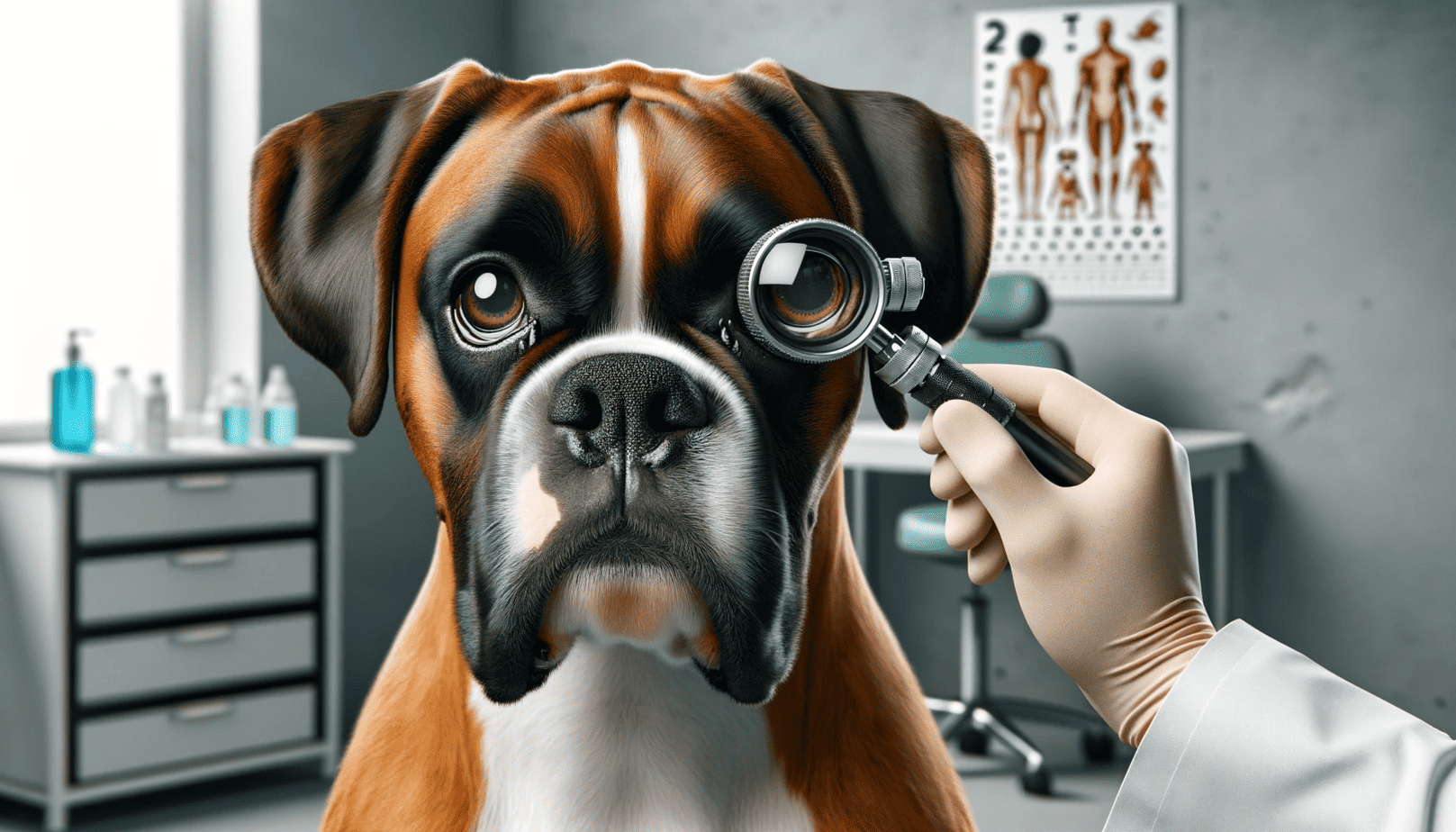
Understanding Rottweiler Specific Eye Structure
If you’re a Boxer parent, knowing the unique characteristics of your beloved pet’s eyes can be a game-changer. In this section, we’ll delve into the fascinating world of Boxer-specific eye structure, helping you understand why this breed is prone to certain eye issues and how you can play an active role in their eye health.
Boxers are a brachycephalic breed, meaning they have a short, broad skull. This physical trait affects their eyes too. Boxers have prominent, slightly protruding eyes that give them their distinctive appearance. However, this also makes them more susceptible to eye injuries and certain health conditions.
Cornea and Eyelids
The cornea, the clear front surface of the eye, is particularly vulnerable in Boxers due to their facial structure. Additionally, their eyelids are often not as tight-fitting as in other breeds, which can lead to various issues like entropion (inward rolling of the eyelid) or ectropion (outward rolling of the eyelid).
Another unique aspect of Boxer eye structure is their third eyelid, also known as the nictitating membrane. This additional eyelid serves as an extra layer of protection for the eye. However, it can sometimes protrude or become inflamed, leading to a condition known as “cherry eye”.
Sclera and Iris
The sclera, the white part of the eye, tends to be more exposed in Boxers, making it prone to injuries and infections. The iris, the colored part of the eye, is also noteworthy as Boxers are predisposed to certain iris abnormalities.
There’s no doubt that the Boxer’s unique eye structure contributes to their charm. But it also necessitates an enhanced focus on their eye health. As a Boxer parent, understanding these anatomical nuances can help you detect early signs of potential eye problems and seek timely veterinary intervention, ensuring your furry friend’s eyes remain as bright and expressive as their personality.
Remember: Regular check-ups with your vet are essential to monitor your Boxer’s eye health. And always consult your vet if you notice any changes in your Boxer’s eyes, such as redness, swelling, discharge, or changes in behavior like squinting or excessive blinking.
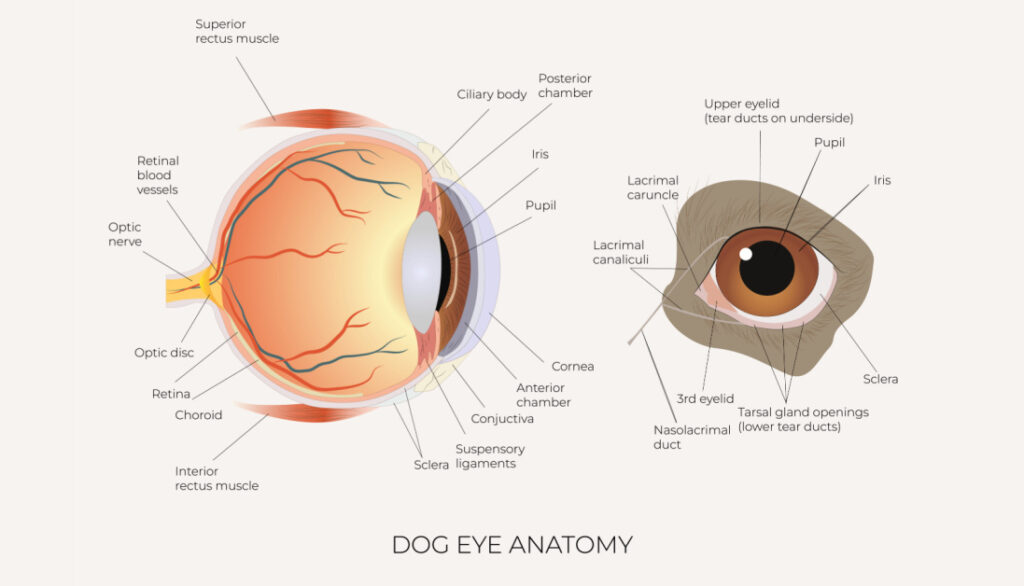
Common Eye Issues In Boxers
As a dedicated veterinarian, I often see Boxers suffering from a variety of eye health issues. The structure of their eyes makes them prone to certain conditions. Understanding these Boxer Eye Health – Conditions & Solutions From Vet can help you take better care of your furry friend.
Boxers are prone to several eye conditions, including:
- Corneal Ulcers: These are painful, open sores on the cornea (the clear front surface of the eye) that can cause redness, excessive tearing, and sensitivity to light.
- Cherry Eye: This condition occurs when the gland of the third eyelid protrudes and becomes visible. It can cause redness, swelling, and sometimes, discharge.
- Entropion: This is a genetic condition where the eyelid rolls inward, causing the eyelashes to rub against the cornea. It can lead to discomfort, tearing, and corneal ulcers.
- Progressive Retinal Atrophy (PRA): This is a group of genetic diseases that cause the retina to deteriorate over time, leading to gradual vision loss.
It’s important to remember that early detection and treatment can make a significant difference in managing these conditions. If you notice any changes in your Boxer’s eyes, such as redness, tearing, cloudiness, or behavioral changes like bumping into objects, it’s crucial to consult a vet immediately.
For Boxer Eye Health – Conditions & Solutions From Vet, we often prescribe topical medications for conditions like corneal ulcers and cherry eye. In some cases, surgical intervention may be necessary. For instance, entropion usually requires surgery to correct the eyelid’s position. PRA, unfortunately, has no cure, but antioxidants and other nutritional supplements can help slow the disease’s progression.
Remember, as a Boxer parent, your vigilance is key to your pup’s eye health. Regular check-ups, immediate attention to any changes, and following your vet’s advice can help ensure your Boxer’s eyes stay as healthy as possible.

Nourishing Your Dog’s Vision: Essential Nutrients for Eye Health
Ensuring your Boxer gets the right nutrients for optimal eye health is essential for maintaining clear vision and preventing age-related issues. Natural, nutrient-rich foods and supplements can play a key role in supporting their eyesight. From vitamin A-packed freeze-dried liver treats to antioxidant-rich blueberries and targeted supplements like Eyeplex by Standard Process, there are several ways to nourish your dog’s eyes. In this section, we’ll explore how these powerful ingredients contribute to long-term vision health and overall well-being.
Eyeplex by Standard Process
Eyeplex by Standard Process is a specialized supplement designed to support your Boxer’s eye health with a blend of essential nutrients. Formulated with key vitamins, minerals, and antioxidants, Eyeplex helps protect against oxidative stress, supports retinal function, and promotes overall vision health. Ingredients like vitamin A, vitamin C, and zinc contribute to maintaining strong eyesight, while whole food ingredients provide additional phytonutrients for cellular protection. Adding Eyeplex to your Boxer’s diet can be especially beneficial for aging dogs or breeds prone to eye conditions, offering targeted nutritional support to keep their vision sharp and healthy for years to come.
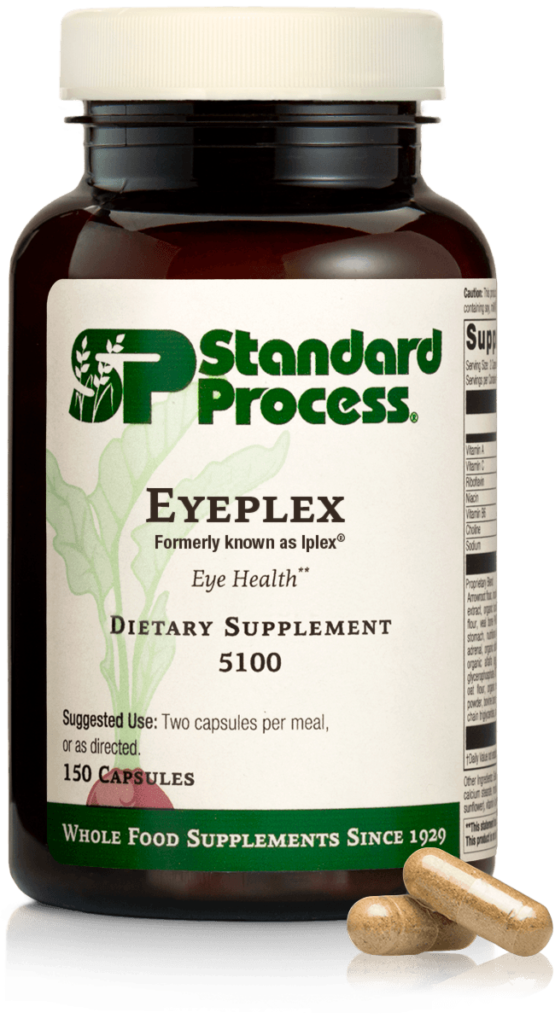
Freeze-Dried Blueberries
Freeze-dried blueberries are a powerhouse of antioxidants that can help protect your Boxer’s eyes from oxidative stress and age-related damage. Rich in vitamins C and E, as well as anthocyanins, these tiny but mighty berries help combat free radicals that can contribute to eye diseases like cataracts and macular degeneration. Incorporating freeze-dried blueberries into your dog’s diet provides a natural and delicious way to support retinal health, reduce inflammation, and promote overall vision longevity. Plus, they’re a low-calorie, dog-friendly treat that makes a great addition to a balanced diet for long-term eye health.
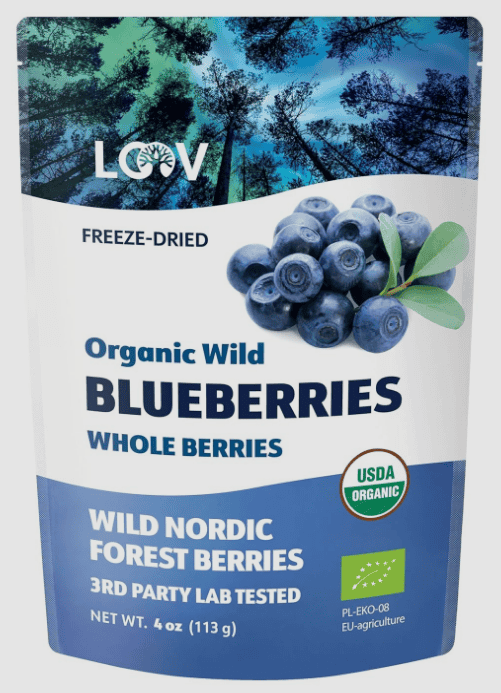
Freeze-Dried Liver
Freeze-dried liver treats are an excellent natural source of vitamin A, an essential nutrient for your Boxer’s eye health. Vitamin A plays a crucial role in maintaining good vision, especially in low-light conditions, while also supporting overall immune function and skin health. Since liver is rich in bioavailable vitamin A, incorporating freeze-dried liver treats into your dog’s diet provides a convenient and nutritious way to promote optimal eye function. Just be sure to feed them in moderation, as excessive vitamin A can lead to toxicity. Adding these nutrient-packed treats to your pup’s routine is a simple, tasty way to support their long-term vision and well-being!
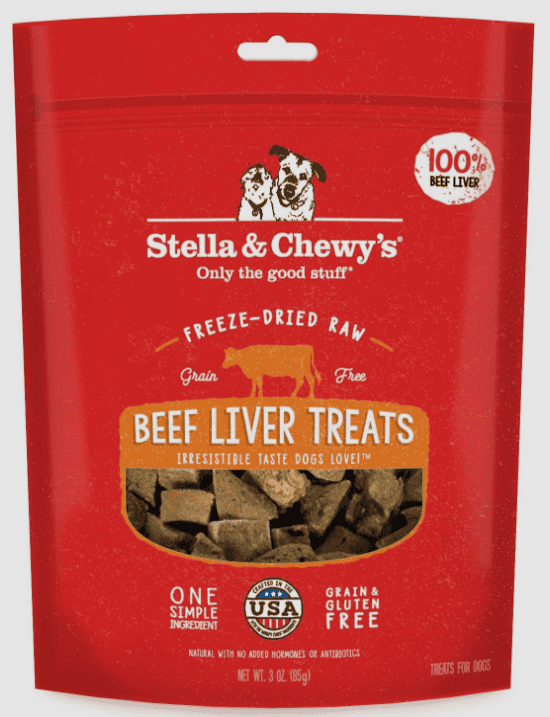
By prioritizing your Boxer’s eye health through a balanced diet and nutritional supplements, you can help prevent many common eye issues. These simple steps can go a long way in ensuring your pup’s eyes stay healthy and clear for years to come.lp prevent many common eye issues and keep your furry friend looking and feeling their best.
Environmental Hygiene To Reduce Eye Problems
As a dog parent, one of the most effective ways to ensure your Boxer’s eye health is by maintaining an environment that minimizes potential hazards and irritants. This includes everything from the quality of indoor air to the types of products you use in your home.
Indoor Air Quality
Indoor air quality plays a significant role in your Boxer’s eye health. Dust, dander, and other airborne particles can irritate your Boxer’s eyes, leading to discomfort, inflammation, and potentially more serious eye conditions. To keep your home’s air clean, consider investing in an air purifier. Regularly changing your home’s air filters can also help reduce the amount of airborne irritants.
Additionally, minimizing your Boxer’s exposure to secondhand smoke is crucial. The toxins in cigarette smoke can cause severe irritation to your pet’s eyes and can lead to chronic eye issues.
Sprays, Diffusers, Candles, Incense
Many common household items can also impact your Boxer’s eye health. Products such as sprays, diffusers, candles, and incense can release chemicals into the air that may irritate your dog’s eyes.
- Sprays: Whether it’s air fresheners, cleaning products, or personal care items, aerosols can contain chemicals that may irritate your pet’s eyes. Opt for non-aerosol versions of these products whenever possible.
- Diffusers: Essential oil diffusers are popular for their pleasant scents and potential health benefits. However, some essential oils can be harmful to dogs, causing eye irritation and other health issues. Always research the safety of specific oils before using them around your pet.
- Candles and Incense: Like sprays and diffusers, candles and incense can release chemicals and smoke that irritate your Boxer’s eyes. Opt for unscented candles or those made from natural waxes like soy or beeswax, and limit the use of incense.
By paying attention to your home environment and making a few simple changes, you can help protect your Boxer’s eyes and ensure they stay healthy. Remember, your vet is a valuable resource for any questions or concerns you may have about your Boxer’s eye health. They can provide further advice tailored to your pet’s specific needs and conditions.

Routine Boxer Eye Care & Maintenance
Keeping your Boxer’s eyes healthy requires consistent care and maintenance. As a responsible dog parent, it’s essential to understand the importance of routine check-ups and preventative measures to ensure your furry friend’s eyes remain in optimal condition.
Daily & Weekly Care & Maintenance
Regular cleaning is vital to keep your Boxer’s eyes free from dust and irritants. Use a clean, damp cloth to gently wipe around the eyes daily. This helps to remove any debris and prevent the buildup of discharge. However, avoid touching the eyeball directly to prevent discomfort or injury.
Boxers are prone to developing “Boxer Dog Eye Problems” like dry eyes, so it’s beneficial to keep artificial tears or dog-specific eye drops on hand. These can help to keep your pet’s eyes moist and alleviate any discomfort. Always consult with your vet before using any products to ensure they’re safe for your pet.
Weekly check-ups are also crucial in maintaining “Eye Health in Boxer Dogs”. Look for any changes in the eye’s appearance, such as redness, cloudiness, or swelling. If you notice any of these signs, it’s time to seek “Veterinary Solutions for Boxer Eye Health”.
Monitor Hair Length, Nail Length, Bath Frequency
Another aspect of maintaining your Boxer’s eye health is monitoring their hair and nail length. Long hair can irritate the eyes and lead to infections, while long nails can accidentally scratch the eyes during play or grooming. Regular grooming and nail trimming can help prevent these issues.
Bath frequency also plays a role in your Boxer’s eye health. Bathing your Boxer too often can dry out their skin and eyes, leading to discomfort. On the other hand, infrequent baths can lead to a buildup of dirt and bacteria, which can cause infections. Aim for a balance, and always use dog-friendly shampoos that are gentle on the eyes.
Remember, the key to maintaining “Boxer Eye Health – Conditions & Solutions From Vet” lies in prevention and early detection. By incorporating these routines into your pet care, you can ensure your Boxer enjoys a life filled with clear sights and happy moments. Always consult with your vet for personalized advice tailored to your Boxer’s specific needs.
Frequently Asked Questions
1. What are common eye conditions in Boxers?
Boxers are prone to various eye conditions such as corneal ulcers, cherry eye, entropion, and ectropion.
2. How can I identify if my Boxer has an eye problem?
Look out for symptoms like redness, excessive tearing, squinting, cloudiness, discharge, or changes in the appearance of the eye. If you notice any of these signs, it’s recommended to consult a veterinarian.
3. Can I prevent eye problems in my Boxer?
While some eye conditions may be hereditary or unavoidable, you can minimize the risk by keeping your Boxer’s eyes clean, avoiding exposure to irritants, and providing a balanced diet with essential nutrients.
4. What should I do if my Boxer has an eye injury?
If your Boxer experiences an eye injury, it’s crucial to seek immediate veterinary attention. Avoid touching or applying any ointments without professional guidance, as it may worsen the condition.
5. How are eye problems in Boxers treated?
Treatment for eye problems in Boxers depends on the specific condition. It may involve medications, eye drops, surgery, or a combination of treatments. Consulting a veterinarian is essential for proper diagnosis and treatment.
